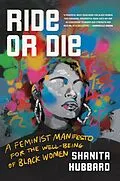Cultural criticism and pop culture history intertwine in this important book, which dissects how hip hop has sidelined Black women's identity and emotional well-being.
A "ride-or-die chick" is a woman who holds down her family and community. She's your girl that you can call up in the middle of the night to bail you out of jail, and you know she'll show up and won't ask any questions. Her ride-or-die trope becomes a problem when she does it indiscriminately. She does anything for her family, friends, and significant other, even at the cost of her own well-being. "No" is not in her vocabulary. Her self-worth is connected to how much labor she can provide for others. She goes above and beyond for everyone in every aspect of her life-work, family, church, even if it's not reciprocated, and doesn't require it to be because she's a "strong Black woman" and everyone's favorite ride-or-die chick. To her, love should be earned, and there's no limit to what she'll do for it.
In this book, author, adjunct professor of sociology, and former therapist Shanita Hubbard disrupts the ride-or-die complex and argues that this way of life has left Black women exhausted, overworked, overlooked, and feeling depleted. She suggests that Black women are susceptible to this mentality because it's normalized in our culture. It rings loud in your favorite hip-hop songs, and it even shows up in the most important relationship you will ever have-the one with yourself.
Compassionate, candid, hard-hitting, and 100 percent unapologetic, Ride or Die melds Hubbard's entertaining conversations with her Black girlfriends and her personal experiences as a redeemed ride-or-die chick and a former "captain of the build-a-brother team" to fervently dismantle cultural norms that require Black women to take care of everyone but themselves.
Ride or Die urges you to expel the myth that your self-worth is connected to how much labor you provide others and guides you toward healing. Using hip hop as a backdrop to explore norms that are harmful to Black women, Hubbard shows the ways you may be unknowingly perpetuating this harm within your relationships. This book is an urgent call for you to pull the plug on the ride-or-die chick.
Autorentext
Shanita Hubbard is an acclaimed writer, American-based Journalism Instructor at the University of Toronto, chair of the Freelance Taskforce for the National Association of Black Journalists, and a Soros Fellow. Her work has been published in New York Times, Huffington Post, Guardian, Pitchfork, ESSENCE, and a host of other publications. Hubbard's writing has helped foster complex discourse around intracommunity sexual violence, abuse within the hip-hop community, and the complicated relationship between Black women and hip-hop.
Klappentext
A feminist manifesto from sociologist and journalist Shanita Hubbard that mixes cultural criticism and pop culture history to dissect how hip hop has sidelined Black women's identity and emotional wellbeing.
As a Black feminist who writes extensively about misogynoir and social justice, Shanita Hubbard's relationship with hip-hop has always been complicated. For Hubbard-and many Black people-hip-hop is a beloved genre of music that offers a voice against injustice, a means to elevate cultural consciousness, and, like all music, a reason to dance. But one day, while listening to the song "One Love" Hubbard became increasingly unsettled as one of her favorite rappers told a story about the injustice of mass incarceration of Black men but did not mention the painful truths of the Black women who often must support them and their children through financial and emotional hardship. In fact it, was the opposite, he reduced them to two categories -unsupported lovers or broken-hearted mothers. Hubbard surmised that in her community-and by extension in hip-hop- there is a hierarchy dictating whose lived experiences takes priority. Ride-Or-Die comes as a fervent disruption to the notion replayed in hip hop that Black women are not worth healthy love and care unless they live up to impossible, male-defined standards of womanhood.
In a combination of personal narrative and cultural criticism, Hubbard uses hip-hop as a vehicle to explore social issues that distinctly affect Black women but are consistently left out of dialogues about race, gender, and history in and out of Black communities. She deconstructs the archetypes that have been put upon Black women like the "ride or die chick" who sticks with her man through everything and narrow versions of "Black girl magic" that are laced with respectability politics. Hubbard's sociological analysis reveals how these tropes cause more harm than good, leading to gender-based violence, silent suffering, and even suicidal ideation. No woman is immune to hop-hop's misogynistic messaging, Hubbard asserts, not even sexually liberated mega-rapper Megan Thee Stallion, who was asked for proof when she was shot by her lover Tory Lanez, or pop and R&B titan, Beyonce, who was subjected to public scrutiny and judgment following the infidelity of her husband and iconic rapper Jay-Z.
In a hard-hitting and nuanced narrative Ride-Or-Die tackles the expectation that Black women must provide unreciprocated love, loyalty, and protection to everyone around them. Using both old-school and contemporary figures as examples Hubbard dissects how music and pop culture echo that sentiment. She addresses violence masked as bravado, emotional abuse described as love, and unrealistic pressures of body, sensuality, and work ethic that often ask us to forego our intuition, safety and security. She charges Black men and others to hold each other accountable for their contributions to these narratives, taking them to task on long-held behaviors in order to foster communal healing. Ride-Or-Die is more than a book about hip hop. It is a beautifully rendered feminist manifesto on the importance of Black women's emotional lives.
